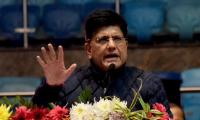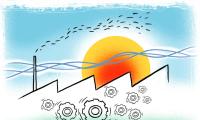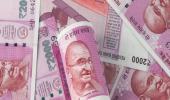EU Ecodesign Norms Impact Indian Exports: GTRI
EU's new ecodesign regulations will impact Indian exports of iron, steel, textiles, tyres and more, increasing costs and requiring digital product passports.
New Delhi, Jun 19 (PTI) The European Union's new ecodesign for sustainable products regulation will impact exporters of sectors, including iron, steel, aluminium, textiles, furniture, tyres, and paints, as it would increase the cost competitiveness of these goods, economic think tank GTRI said on Wednesday.
From January 2026, Indian products exported to the EU (European Union) will need to include a QR code or barcode accessible detailed information to prove that the product meets the prescribed European sustainability standards.
The Global Trade Research Initiative (GTRI) said the EU will enforce these standards through the Ecodesign for Sustainable Products Regulation (ESPR), beginning with select products in January 2026 and extending to all products by 2030.
"Exporters of iron, steel, aluminium, textiles, furniture, mattresses, tyres, detergents, paints, and lubricants will be the first impacted by these regulations starting January 2026," it said, adding that Indian exports are already struggling with the EU's Carbon Border Adjustment Mechanism, deforestation, and supply chain regulations.
It added that the ESPR requires each product exported to the EU to have a Digital Product Passport (DPP), accessible via a barcode or QR code. The DPPs will assist regulators in enforcing compliance.
"It will allow traceability back to the manufacturer, input suppliers and everyone in the chain. DPP will provide detailed information on a product's environmental impact, durability, and reparability. The information will be very detailed and different from product to product. With the ESPR in place, the EU will now publish numerous delegated acts specifying product-specific DPP requirements," the think tank said.
It also said that the details will include requirements on product design, emphasising energy efficiency, durability, repairability, recyclability, and overall environmental impact of a product.
These delegated acts may be enforced as soon as they are adopted and the first set may be implemented from January 2026, it said, adding that all such acts are expected to be rolled out by 2030.
GTRI Founder Ajay Srivastava said that sustainability and quality are related but distinct concepts.
"While quality focuses on the performance and reliability of a product from the user's perspective, sustainability considers the broader environmental and societal impacts throughout the product's lifecycle," he said.
The ESPR was officially adopted by both the European Parliament and the Council in April and May 2024, respectively. The EU has introduced the ESPR to promote environmentally sustainable products across the EU.
Explaining further, Srivastava said that the regulation will lead to high costs of products because of changes needed in production processes and since most products covered are consumer products, the price rise may lead to inflation in the EU.
"The ESPR could hurt exports from developing countries due to the increased costs and challenges of meeting high EU standards and compliance costs. The EU says that the ESPR aims to empower consumers to make more informed and sustainable choices," he added.
He said that in this backdrop, Indian firms exporting to the EU must proactively prepare to comply with the requirements to maintain their market presence and leverage the shift towards sustainability for competitive advantage.
Indian firms exporting to the EU should take steps such as evaluating the environmental impact of their products throughout their life cycle; getting proper information about the regulation's development and implementation timelines; creating strategies to meet the ESPR requirements for affected product categories; and ensuring that suppliers provide necessary sustainability data for the digital product passports.
India is negotiating a free trade agreement with the EU to boost trade and investment ties. The eighth round of talks for the proposed pact is scheduled from June 24-28 in Brussels.
India's exports to the EU rose about 1.5 per cent to USD 76 billion in 2023-24, while imports dipped by about 3 per cent to USD 59.38 billion in 2023-24.
From January 2026, Indian products exported to the EU (European Union) will need to include a QR code or barcode accessible detailed information to prove that the product meets the prescribed European sustainability standards.
The Global Trade Research Initiative (GTRI) said the EU will enforce these standards through the Ecodesign for Sustainable Products Regulation (ESPR), beginning with select products in January 2026 and extending to all products by 2030.
"Exporters of iron, steel, aluminium, textiles, furniture, mattresses, tyres, detergents, paints, and lubricants will be the first impacted by these regulations starting January 2026," it said, adding that Indian exports are already struggling with the EU's Carbon Border Adjustment Mechanism, deforestation, and supply chain regulations.
It added that the ESPR requires each product exported to the EU to have a Digital Product Passport (DPP), accessible via a barcode or QR code. The DPPs will assist regulators in enforcing compliance.
"It will allow traceability back to the manufacturer, input suppliers and everyone in the chain. DPP will provide detailed information on a product's environmental impact, durability, and reparability. The information will be very detailed and different from product to product. With the ESPR in place, the EU will now publish numerous delegated acts specifying product-specific DPP requirements," the think tank said.
It also said that the details will include requirements on product design, emphasising energy efficiency, durability, repairability, recyclability, and overall environmental impact of a product.
These delegated acts may be enforced as soon as they are adopted and the first set may be implemented from January 2026, it said, adding that all such acts are expected to be rolled out by 2030.
GTRI Founder Ajay Srivastava said that sustainability and quality are related but distinct concepts.
"While quality focuses on the performance and reliability of a product from the user's perspective, sustainability considers the broader environmental and societal impacts throughout the product's lifecycle," he said.
The ESPR was officially adopted by both the European Parliament and the Council in April and May 2024, respectively. The EU has introduced the ESPR to promote environmentally sustainable products across the EU.
Explaining further, Srivastava said that the regulation will lead to high costs of products because of changes needed in production processes and since most products covered are consumer products, the price rise may lead to inflation in the EU.
"The ESPR could hurt exports from developing countries due to the increased costs and challenges of meeting high EU standards and compliance costs. The EU says that the ESPR aims to empower consumers to make more informed and sustainable choices," he added.
He said that in this backdrop, Indian firms exporting to the EU must proactively prepare to comply with the requirements to maintain their market presence and leverage the shift towards sustainability for competitive advantage.
Indian firms exporting to the EU should take steps such as evaluating the environmental impact of their products throughout their life cycle; getting proper information about the regulation's development and implementation timelines; creating strategies to meet the ESPR requirements for affected product categories; and ensuring that suppliers provide necessary sustainability data for the digital product passports.
India is negotiating a free trade agreement with the EU to boost trade and investment ties. The eighth round of talks for the proposed pact is scheduled from June 24-28 in Brussels.
India's exports to the EU rose about 1.5 per cent to USD 76 billion in 2023-24, while imports dipped by about 3 per cent to USD 59.38 billion in 2023-24.
You May Like To Read
TODAY'S MOST TRADED COMPANIES
- Company Name
- Price
- Volume
- Vodafone-Idea
- 11.36 ( -2.49)
- 94664837
- AvanceTechnologies
- 1.16 (+ 4.50)
- 34522155
- Sunshine-Capital
- 0.26 ( -3.70)
- 29015901
- Alstone-Textiles
- 0.27 ( -3.57)
- 28695959
- Mehai-Technology
- 1.65 ( -4.62)
- 28262795






